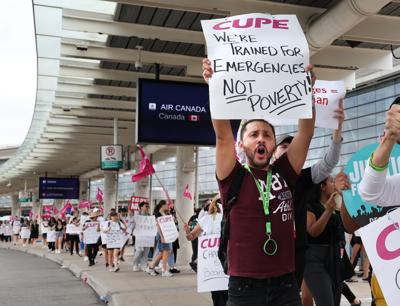Air Canada flight attendants have voted to turn down the tentative agreement that ended a three-day strike last month — but flights will continue to take off, the airline said.Ìý
The Canadian Union of Public Employees’ Air Canada component (CUPE), which represents more than 10,000 flight attendants working for Air Canada and Air Canada Rouge, announced that an  on Saturday afternoon.Ìý
“Even with the proposed increase, Air Canada flight attendants would still earn less than federal minimum wage,” CUPE wrote in a statement.Ìý
“Full-time workers at a flagship corporation and the national air carrier should not be earning less than minimum wage and qualifying for income supports.”Â
Negotiations surrounding wages will now move on to mediation and, possibly, arbitration — but there will be no strike or lockout, according to .Ìý
“Air Canada and CUPE contemplated this potential outcome and mutually agreed that if the tentative agreement was not ratified, the wage portion would be referred to mediation and, if no agreement was reached at that stage, to arbitration. The parties also agreed that no labour disruption could be initiated,” the statement said, adding that Air Canada remains fully committed to negotiating.Ìý
“The negotiations period has been challenging for all Air Canada stakeholders. We deeply appreciate the patience and the confidence our customers have shown as we worked through this process.”Â
CUPE had reached a mediated agreement with the country’s largest carrier on Aug. 19 following a strike that grounded tens of thousands of passengers worldwide.
The labour disruption culminated in Ottawa ordering the flight attendants into binding arbitration and to return to work, with union president Mark Hancock refusing the order, saying “if it means folks like me going to jail, so be it.”Â
The union then began the ratification vote on the new contract, which included a 12 per cent salary raise this year for most junior flight attendants and an eight per cent bump for more senior members, followed by smaller increases in subsequent years.
According to CUPE, a full-time Rouge flight attendant would earn $2,219 monthly, while a full-time mainline flight attendant would earn $2,522.Ìý
The Air Canada component of CUPE also said 95 per cent of its members — approximately 9,500 people — voted.
That sheer number shows “a tremendous amount of cohesion and discipline among the working group,” said Steven Tufts, an associate professor at York University. “When there’s that much discipline, it’s really hard for the employer to divide workers.”Â
Given the strong voter turnout and opposition to the agreement, the airline faces a risk of a “wildcat strike,” added Tufts. That’s when workers strike without the union’s authorization or support.Ìý
“We’ll have to see what happens tomorrow if workers do come to work.”Â
Larry Savage, a labour studies professor at Brock University, said the structure of the tentative agreement gave members little reason to ratify it.Ìý
“Once workers’ expectations are elevated — and especially when they’ve taken risks to secure a deal — they’re looking for significant gains,” he said in a social media post, as well as in a written statement to the Star.Ìý
“While the agreement contains improvements, the union did not secure the same kinds of wage increases we saw for flight attendants at Air Transat or pilots at Air Canada. In relative terms, many flight attendants were looking for more than the deal they got.”Â
In a statement, CUPE said that the issue of flight attendants’ compensation “remains unresolved.”
“Air Canada flight attendants were able to obtain partial pay for some of their ground duties in this round of bargaining, representing important progress in the fight to end unpaid work,” the statement added.Ìý
“This is only the beginning.”Â
With files from The Canadian Press.Ìý


























To join the conversation set a first and last name in your user profile.
Sign in or register for free to join the Conversation